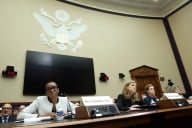You have /5 articles left.
Sign up for a free account or log in.
Non-tenure-track faculty members are the majority of the teaching force, so what are colleges and universities doing to help them develop as teachers? As for many issues related to adjuncts, there’s a significant data gap on the topic -- in part because adjuncts are diverse and decentralized, making them hard to study. But a new survey out of the University of Louisville seeks to close the gap, and early responses provide insight into how colleges and universities’ teaching and learning centers are supporting their part-time faculty members -- or not.
“We want to know what’s really going on out there,” said Roy Fuller, a part-time faculty fellow at Louisville’s Delphi Center for Teaching and Learning and co-leader of a new survey of teaching and learning center-sponsored professional development opportunities for adjuncts. “This is really important.”
The 28-question survey includes questions on whether faculty development programs are available and targeted to adjuncts, whether adjuncts are compensated for attending, what they learn and whether they’re part of a union. The results will be published in a forthcoming book from Stylus.
Over and over again, Fuller said, early respondents (fewer than 50 in number) to the Exploring the State of Adjunct Faculty Development Survey report problematic scheduling of faculty development. Adjuncts need professional development in the evening or on weekends, he said, when they are less likely to be teaching; teaching and learning centers, however, tend to schedule seminars during the workday.
Respondents also report the consistent challenge of communicating with adjuncts, who come and go from campus on different schedules and don’t always have official email addresses.
As for compensation, Fuller said it’s too soon to say whether most adjuncts are compensated for the time they spend on faculty development, or how much. But some are paid while others are offered other incentives, such as a certificate. (It should be noted that the most recent survey of four-year-college faculty by the Higher Education Research Institute at the University of California at Los Angeles found that 13.5 percent of adjuncts had access to professional development funds. The survey didn't ask for details such as if those professional development opportunities were adjunct specific.)
And what kind of training are non-tenure-track faculty members getting? Fuller said that colleges report offering adjuncts a new faculty member orientation pretty consistently. Some orientations are basic introductions to the campus -- parking here, library there -- but others involve teaching and counseling skills, such as how to respond to students in crisis.
Beyond orientation, he said, colleges vary widely on the kinds of professional development they offer. At Louisville, he said, adjuncts are invited to a part-time faculty “institute” that meets in the evenings three to four times per semester. Those who attend three sessions gets $200 and a certificate they’re encouraged to include in their résumés.
Fuller said community colleges tend to a do a better job than universities at offering non-tenure-track-specific development -- probably because they have more non-tenure-track faculty members. At the Valencia College in Florida, for example, participation in a similar institute-like program can result in the new title of associate faculty and a pay raise of $38 per contract hour taught.
In Fuller’s experience, he said, non-tenure-track faculty members tend to appreciate adjunct-specific professional development because many are “starved for a community.” Louisville’s institute sessions, which cap at 25 participants, are usually full. Topics include motivating students, teaching critical thinking and how memory works. Fuller, who is himself a part-time faculty member, offers dinner as an additional incentive.
Adrianna Kezar, professor of higher education and director of the Delphi Project on the Changing Faculty and Student Success at the University of Southern California, underlined the need to close the data gap on faculty development, saying teaching training is “essential” for the many adjuncts who come to higher education from other careers in industry.
Gary Rhoades, professor and director of the Center for the Study of Higher Education at the University of Arizona, said it’s not unusual for collective bargaining agreements to have professional development funds or opportunities for non-tenure-track faculty -- but not as common as it should be, according to his ongoing research.
Examples of relatively big wins for adjuncts include George Washington University, where part-time faculty members affiliated with Service Employees International Union get $35,000 in professional development annually, Rhodes said. The Tufts University SEIU contract guarantees $25,000 per year. And at American University, the SEIU contract provides adjunct faculty access to the campus Center for Teaching, Research and Learning.
“These are important steps to investing in quality working conditions that enhance students’ learning conditions,” Rhoades said.
As for what kind of professional development should be prioritized for adjuncts, Rhoades said that’s best left up to adjuncts themselves.
Maria Maisto, president of the New Faculty Majority, a national adjunct advocacy group, is an adjunct professor of English at Cuyahoga Community College in Ohio, which recently upped its annual Adjunct Professional Development Workshop stipend from $250 to $500. Adjuncts must attend five college-sponsored sessions to earn the stipend. As at most colleges and universities, external professional development opportunities -- including attendance at disciplinary conferences -- are not eligible for the stipend.
Maisto said the recent stipend increase was good news, and likely a result of the adjunct organizing that’s been happening on campus.
Generally, she said, “unless there is a union or professional association that is actively working to identify what is most needed and working to get the appropriate funding, most institutions give lip service to professional development or provide programs into which contingent faculty themselves have little to no input.”
Like Rhoades, Maisto said that adjuncts -- because of their diversity and professionalism -- should be the ones to determine what their development needs are and have a leading voice in determining priorities, “in the same way that tenure-track faculty do with respect to their own professional development.”









